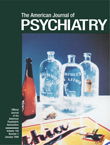Letters to the Editor
To the Editor: Sildenafil citrate is a newly approved drug for men with erectile dysfunctions that works through relaxation of the smooth muscle induced by nitric oxide/cyclic guanosine monophosphate (1). Patients receiving selective serotonin reuptake inhibitors (SSRIs) often experience the side effects of impaired desire, erectile dysfunction, and orgasm dysfunctions such as in delay and satisfaction, resulting in distress and SSRI discontinuation (2). I wish to report the cases of two men and one woman who responded to treatment with sildenafil.
Mr. A was a 56-year-old man, otherwise healthy, with a 10-year history of dysthymia who was taking sertraline, 50 mg/day. He had a pre-SSRI history of erectile dysfunction. Since beginning sertraline, he experienced severe orgasm delay and impotence. Sildenafil before masturbation was first prescribed to titrate the dose and foster confidence. One hour after taking sildenafil, 50 mg, Mr. A regained full erections during self-stimulation. Subsequently, following sildenafil administration, he was able to reach orgasm during vaginal intercourse for the first time in a decade. He continued to experience mild orgasm delay despite higher doses.
Mr. B was a 23-year-old man, otherwise healthy, with a 6-year history of bipolar II disorder; he required daily, continual treatment with fluoxetine hydrochloride, 20 mg; gabapentin, 100 mg; diazepam, 5 mg; and dextroamphetamine sulfate, 5 mg. He had a pretreatment history of mild erectile dysfunction. During treatment, he experienced severe impotence and orgasm delay. Sildenafil, 100 mg, provided satisfactory erections about half of the time and enabled penetration during intercourse with unprecedented success, despite continued mild orgasm delay.
Ms. C was a 54-year-old postmenopausal woman in otherwise good health who had been taking fluoxetine first for dysthymia and then for depression for 4 years as well as standard postmenopausal estrogen replacement therapy (medroxyprogesterone acetate 10 mg/day) for 6 years. Fluoxetine doses above 40 mg/day obliterated her ability to reach orgasm, and she required up to 80 mg/day. She reported her first orgasm in more than 18 months during clitoral stimulation after taking sildenafil, 50 mg. She continued to experience impaired orgasm satisfaction and delay, however, even with doses of 50–100 mg. Ms. C complained of flushing, lethargy, and headache for 24 hours after sildenafil administration.
In sum, sildenafil benefited two male patients taking SSRIs who had severe, refractory erectile dysfunctions and one postmenopausal female patient with secondary anorgasmia. Patients were screened for contraindications to sildenafil therapy, such as nitrate therapy, and were advised about sildenafil’s side effects and risks (1, 3), including the possibility that lethargy and headache, which are associated with both sildenafil and SSRIs, may be worsened by taking both medications simultaneously. None of the patients experienced untoward effects such as cardiac events.
Disruptions of nitric oxide metabolism have been postulated to mediate SSRI-induced sexual disturbances such as erectile dysfunction (4), and sildenafil may correct the theoretical defects. In addition, some of the SSRI-induced side effects, such as decreased libido and orgasm delay, may be unrelated to nitric oxide metabolism, but sildenafil may enable patients to compensate for these sexual disturbances by improving erections and increasing vasocongestion. Further studies are indicated. Until such time, given the uncertain teratogenic potential, sildenafil should not be prescribed for premenopausal women.
1. Goldstein I, Lue TF, Padma-Nathan H, Rosen RC, Steers WD, Wicker PA: Oral sildenafil in the treatment of erectile dysfunction. N Engl J Med 1998; 338:1397–1404; correction, 339:59Crossref, Medline, Google Scholar
2. Seagraves RT: Treatment-emergent sexual dysfunction in affective disorder: a review and management strategies. J Clin Psychiatry Monograph 1993; 1:57–60Google Scholar
3. Morales A, Gingell C, Collins M, Wicker PA, Osterloh IH: Clinical safety of oral sildenafil citrate (Viagra) in the treatment of erectile dysfunction. Int J Impot Res 1998; 10:69–74Crossref, Medline, Google Scholar
4. Sussman N, Ginsberg D: Rethinking side effects of the selective serotonin reuptake inhibitors: sexual dysfunction and weight gain. Psychiatr Annals 1998; 28:89–97Crossref, Google Scholar



